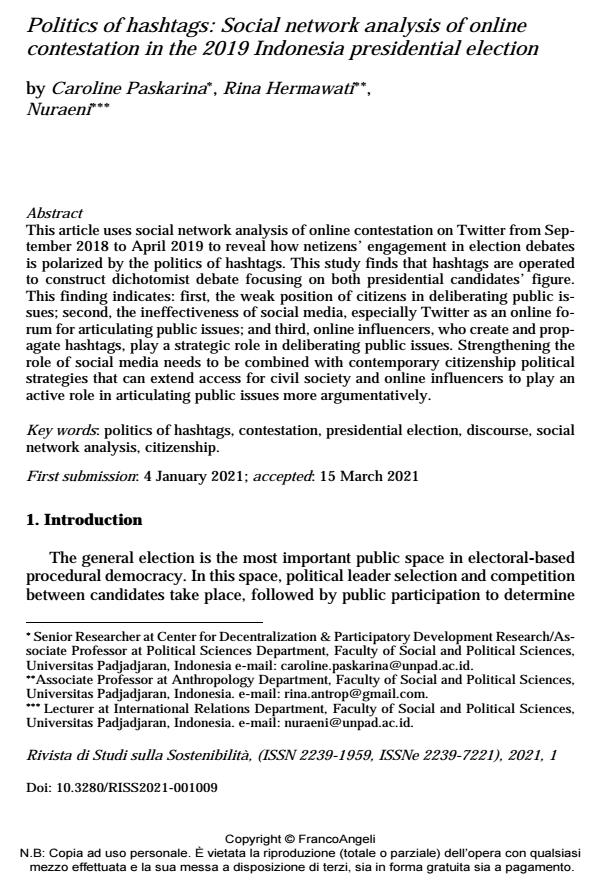Politics of hashtags: Social network analysis of online contestation in the 2019 Indonesia presidential election
Titolo Rivista RIVISTA DI STUDI SULLA SOSTENIBILITA'
Autori/Curatori Caroline Paskarina, Rina Hermawati Nuraeni
Anno di pubblicazione 2021 Fascicolo 2021/1
Lingua Inglese Numero pagine 20 P. 151-170 Dimensione file 489 KB
DOI 10.3280/RISS2021-001009
Il DOI è il codice a barre della proprietà intellettuale: per saperne di più
clicca qui
Qui sotto puoi vedere in anteprima la prima pagina di questo articolo.
Se questo articolo ti interessa, lo puoi acquistare (e scaricare in formato pdf) seguendo le facili indicazioni per acquistare il download credit. Acquista Download Credits per scaricare questo Articolo in formato PDF

FrancoAngeli è membro della Publishers International Linking Association, Inc (PILA), associazione indipendente e non profit per facilitare (attraverso i servizi tecnologici implementati da CrossRef.org) l’accesso degli studiosi ai contenuti digitali nelle pubblicazioni professionali e scientifiche.
This article uses social network analysis of online contestation on Twitter from September 2018 to April 2019 to reveal how netizens’ engagement in election de-bates is polarized by the politics of hashtags. This study finds that hashtags are operated to construct dichotomist debate focusing on both presidential candi-dates’ figure. This finding indicates: first, the weak position of citizens in deliberat-ing public issues; second, the ineffectiveness of social media, especially Twitter as an online forum for articulating public issues; and third, online influencers, who create and propagate hashtags, play a strategic role in deliberating public issues. Strengthening the role of social media needs to be combined with contemporary citizenship political strategies that can extend access for civil society and online influencers to play an active role in articulating public issues more argumentative-ly.
Parole chiave:politics of hashtags, contestation, presidential election, discourse, so-cial network analysis, citizenship.
- Guarding the people’s vote: why ethics dimension matters for public trust to E-recapitulation in the Indonesia 2024 election Caroline Paskarina, Mustabsyirotul Ummah Mustofa, Rina Hermawati, Eddy Nurmanto, Rangga Wardana, in Cogent Social Sciences 2586372/2025
DOI: 10.1080/23311886.2025.2586372 - Analysis and mining of an election-based network using large-scale twitter data: a retrospective study Amartya Chakraborty, Nandini Mukherjee, in Social Network Analysis and Mining 74/2023
DOI: 10.1007/s13278-023-01081-0 - Sosyal Medyanın Seçmenlerin Siyasal Kararlarına Etkileri Üzerine Bir Etkileşim Araştırması: 14 Mayıs 2023 Cumhurbaşkanlığı Seçimleri Twitter İçerik Analizi Gökhan Gürbüz, İdil Sayımer, in Elektronik Cumhuriyet İletişim Dergisi /2024 pp.38
DOI: 10.54089/ecider.1488943 - Public Trust in the Time of Pandemic: An Analysis of Social Networks in the Discourse of Large-Scale Social Restrictions in Indonesia Caroline Paskarina, in Social Sciences /2023 pp.186
DOI: 10.3390/socsci12030186
Caroline Paskarina, Rina Hermawati Nuraeni, Politics of hashtags: Social network analysis of online contestation in the 2019 Indonesia presidential election in "RIVISTA DI STUDI SULLA SOSTENIBILITA'" 1/2021, pp 151-170, DOI: 10.3280/RISS2021-001009